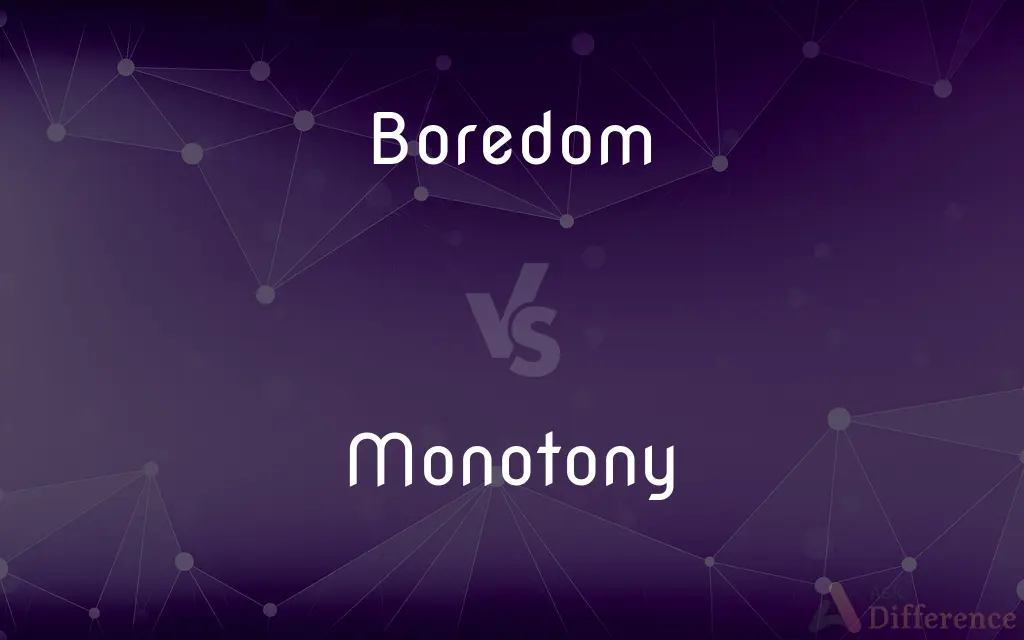Boredom vs. Monotony — What's the Difference?
By Tayyaba Rehman — Published on November 13, 2023
Boredom is the state of feeling disinterested and restless due to lack of stimulation, while Monotony refers to a lack of variety or change, leading to boredom.

Difference Between Boredom and Monotony
Table of Contents
ADVERTISEMENT
Key Differences
Boredom is a subjective emotional state characterized by feelings of restlessness and dissatisfaction, usually resulting from a lack of interest or excitement. On the other hand, Monotony is an objective condition characterized by repetition or a lack of variety, which can often lead to feelings of boredom.
Boredom can arise from various situations, not necessarily from repetition. For example, an individual might feel bored because they are not mentally stimulated or because they are not engaged in their current activity. Monotony, in contrast, is specifically the sameness or repetitiveness of a situation or task.
While experiencing Monotony can often lead to Boredom, it's not the only cause. A person can feel bored even in diverse and changing situations if they're not personally interested or invested in them. Conversely, some individuals might find comfort in Monotony and not feel bored by repetitive tasks.
Boredom is the emotional response or reaction to one's environment or situation, while Monotony is one of the conditions of that environment or situation. To counteract Boredom, one might seek change or stimulation, but to break Monotony, one would introduce variety or change to the routine.
Comparison Chart
Nature
Subjective emotion
Objective condition
ADVERTISEMENT
Arises from
Lack of interest or stimulation
Repetition or lack of variety
Relation
Reaction to a situation
Condition of a situation
Solution
Seek stimulation or change
Introduce variety or change
Can co-exist?
One can feel Boredom without Monotony
Monotony can exist without causing Boredom
Compare with Definitions
Boredom
An emotional state of dissatisfaction.
She left the party early, overwhelmed by Boredom.
Monotony
A continuous, unchanging environment.
The desert's Monotony was broken only by occasional cacti.
Boredom
Resulting from a lack of stimulation.
The lecture's Boredom was palpable.
Monotony
Lack of variety or change.
Daily routine can sometimes fall into Monotony.
Boredom
A feeling of disinterest and restlessness.
The movie induced such Boredom that she fell asleep.
Monotony
Repetition that can lead to Boredom.
The Monotony of the task made it difficult to concentrate.
Boredom
A sense of weariness from uninteresting activity.
Reading the manual was sheer Boredom.
Monotony
A state of sameness or repetitiveness.
The Monotony of the landscape made the drive tedious.
Boredom
An experience of ennui or tediousness.
Boredom set in after hours of waiting.
Monotony
Uniformity in tone or sound.
The Monotony of his voice put the audience to sleep.
Boredom
The condition of being bored; ennui.
Monotony
Uniformity or lack of variation in pitch, intonation, or inflection.
Boredom
(uncountable) The state of being bored.
Monotony
Tedious sameness or repetitiousness
The monotony of daily routine.
Boredom
(countable) An instance or period of being bored; A bored state.
Monotony
Tedium as a result of repetition or a lack of variety.
Boredom
The state of being bored, or pestered; a state of ennui.
Monotony
(mathematics) The property of a monotonic function.
Boredom
The realm of bores; bores, collectively.
Monotony
The quality of having an unvarying tone or pitch.
Boredom
The feeling of being bored by something tedious
Monotony
A frequent recurrence of the same tone or sound, producing a dull uniformity; absence of variety, as in speaking or singing.
Monotony
Any irksome sameness, or want of variety.
At sea, everything that breaks the monotony of the surrounding expanse attracts attention.
Monotony
The quality of wearisome constancy and lack of variety;
He had never grown accustomed to the monotony of his work
He hated the sameness of the food the college served
Monotony
Constancy of tone or pitch or inflection
Common Curiosities
Is Monotony always negative?
Not necessarily. Some people find comfort in routine or repetitive tasks.
Is Boredom a mental or emotional state?
Boredom is an emotional state characterized by feelings of disinterest.
What can break Monotony?
Introducing variety or change can break Monotony.
Can one feel Boredom without experiencing Monotony?
Yes, Boredom can arise from various causes, not just Monotony.
Is Boredom linked to mental health?
Chronic Boredom can be, but occasional Boredom is a natural feeling.
Are children more prone to Boredom than adults?
Both can experience Boredom, but children might express it more openly.
Can Monotony exist without leading to Boredom?
Yes, Monotony is an objective condition and doesn't always result in Boredom.
Is Boredom a modern-day problem?
Boredom has always existed, but modern lifestyles might amplify it.
Can a monotonous task be interesting?
Yes, if someone finds personal value or interest in it.
How can one combat Boredom?
Seeking new experiences, challenges, or stimulation can combat Boredom.
Does Monotony always lead to Boredom in the workplace?
Not always, but prolonged Monotony can reduce job satisfaction.
Can a monotonous life have benefits?
Yes, routines and predictability can provide comfort and stability.
How do artists break Monotony in their work?
By introducing new themes, techniques, or exploring different mediums.
Does technology reduce or increase Boredom?
It can do both: provide stimulation and create feelings of missing out.
Can Boredom lead to creativity?
Yes, Boredom can be a catalyst for seeking new experiences and ideas.
Share Your Discovery

Previous Comparison
Hotplate vs. Induction Cooker
Next Comparison
Mass Transfer vs. DiffusionAuthor Spotlight
Written by
Tayyaba RehmanTayyaba Rehman is a distinguished writer, currently serving as a primary contributor to askdifference.com. As a researcher in semantics and etymology, Tayyaba's passion for the complexity of languages and their distinctions has found a perfect home on the platform. Tayyaba delves into the intricacies of language, distinguishing between commonly confused words and phrases, thereby providing clarity for readers worldwide.












































